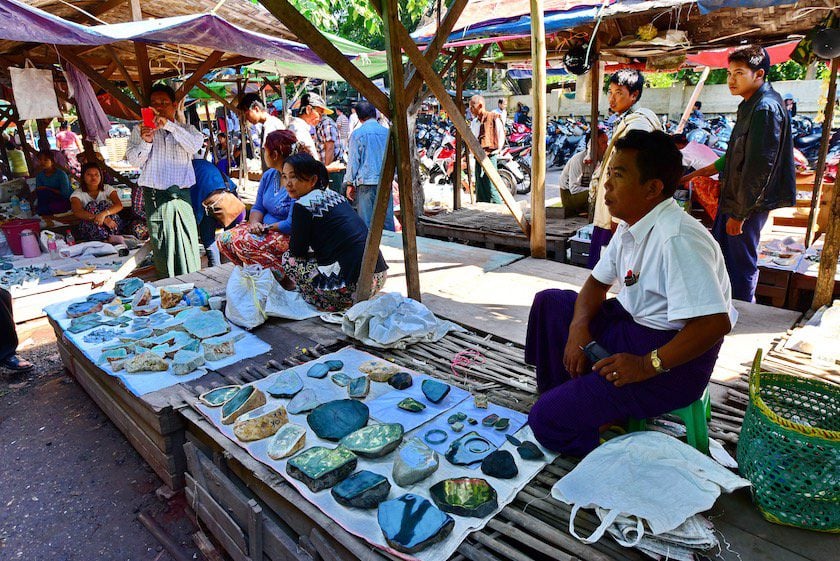Do the 2021 US Myanmar Sanctions Affect the Jade Trade?
What do the 2021 Myanmar sanctions cover and will they affect the jade trade? Learn about the origins, scope, and possible results of this US policy.
2 Minute Read
Answer: In April 2021, the US sanctioned the Myanmar Gems Enterprise (MGE), a state-owned entity and subdivision of the Ministry of Mines. The MGE is responsible for all gemstone mining, distribution, and marketing in Myanmar, formerly known as Burma. This includes jadeite — one of the two minerals classified as jade.
What Led to the Myanmar Sanctions?
The purpose of the sanctions is to deny funding to the Myanmar military government. The Myanmar military overthrew the democratically-elected government and took control by force in February 2021. Subsequently, the military leadership committed — and continues to commit — severe human rights abuses. The international community has condemned these actions.
Interested in this topic?
This article is also a part of our Jade Specialist Mini Course, in the unit How to Choose Jade.
Why do the Sanctions Apply to Gemstones?
Myanmar is famous for its rubies. The trade term "Burmese rubies" is synonymous with the highest-quality specimens. Myanmar is also the world's leading source of high-quality jadeite, the most coveted and expensive variety of jade. Additionally, Myanmar holds the only known deposit of maw sit sit, a rare material often used as a jadeite simulant. The production and sale of gemstones is a crucial driver for the Myanmar economy. Some estimate the gemstone industry accounts for 50% of the country's GDP. Thus, gemstones and the MGE were obvious targets for US sanctions.
What Were the Previous Myanmar Sanctions?
The 2021 Executive Order isn't the first time the US sanctioned Myanmar's gemstone industry. After a military coup in 1988, the Myanmar government had a long track record of suppressing religious freedom, forced labor, and other human rights abuses. In September 2007, the Myanmar government cracked down on a group of peaceful protestors.
In response, the US Congress passed a series of bills sanctioning Myanmar, including the Tom Lantos Block Burmese JADE (Junta's Anti-Democratic Efforts) Act of 2008. The Act barred the import of rubies and jadeite from Myanmar to the US via third parties. However, gems bought from Myanmar for personal use were excluded. The exportation of gems from the US to Myanmar was also excluded.
These restrictions ended in 2016, after Myanmar attempted to transition from a military junta to a peaceful democracy and US-Myanmar relations improved.
What Effect Will the New Sanctions Have on the Jade Trade?
The main problem with the current sanctions is that China, the principal consumer market for Burmese jadeite, ignores them. One could best describe the Chinese demand for high-quality jadeite as "insatiable." For centuries, this stone has had significant cultural value to the Chinese.
If the Chinese continue to purchase Burmese jadeite, the MGE will retain a significant source of revenue. This will undermine the goal of the sanctions — to deny Myanmar funding for its anti-democratic and oppressive government — and make them merely symbolic.
International Gem Society
Related Articles
Jadeite Value, Price, and Jewelry Information
Broken Bangle — The Blunder-Besmirched History of Jade Nomenclature: Book Review
How Does Jade Form?
10 Gemstones Rarer than Diamond: The Earth’s Scarcest Treasures
Latest Articles
800 Years of Mogok: A Celebration in Tenuous Times
What is the Average Gemstone Faceting Yield?
Pyroxmangite Value, Price, and Jewelry Information
How to Identify Emerald Simulants and Synthetics
Never Stop Learning
When you join the IGS community, you get trusted diamond & gemstone information when you need it.
Get Gemology Insights
Get started with the International Gem Society’s free guide to gemstone identification. Join our weekly newsletter & get a free copy of the Gem ID Checklist!
